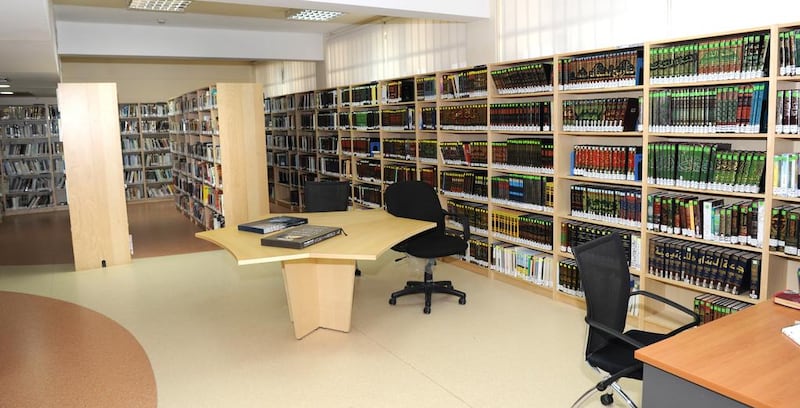ABU DHABI // Overcrowded cells, cruel guards, indiscriminate violence: we have all seen and heard the clichés used to describe prisons in the Middle East — and Al Wathba defies every one of them.
It is closer to a residential detention centre, with living quarters, a clean and well-kept kitchen, a library, a theatre and a workshop.
Built 35 years ago, Al Wathba, about 40 minutes outside of Abu Dhabi city, is the largest and oldest of the emirate's five prisons.
Men's and women's quarters are separated by large metal gates and tight security. But beyond the gates the women's quarters are decorated with murals of pelicans, falcons and forts. Pink flowers bloom along the fortress-style walls and a Quranic verse encouraging hard work is painted over the entrance to the women's prison.
Almost 80 per cent of inmates at Al Wathba are incarcerated for petty crimes, according to Col Mohammed Al Zaabi, manager of Abu Dhabi's punishment and corrections department.
"Our crime rates in the emirate are very low in comparison with other countries, for many reasons, like the low number of organised gangs, strong social networks and religious beliefs. Currently it is not at a concerning rate. Homicides are very low and the majority of crimes prevalent in Abu Dhabi are financial, followed by drug-related crimes and a few thefts."
These kinds of crimes, he said, are almost always tied to the state of the economy.
Abu Dhabi prides itself on its prison conditions, and Col Al Zaabi says the abuses reported in other countries would be impossible in the UAE.
"We live in a globalised world and most of our prisoners are deported after their sentences," he says. "If they had been abused at our correctional facilities in any way then they would speak about it when they went home."
Al Wathba is often subject to random visits from human rights departments and public prosecutors. "They inspect every part of the prison and have private interviews with the inmates," Col Al Zaabi says.
"We follow specific guidelines to ensure that they all receive their full rights in rehabilitation, medical care, nutrition, communicating with their families and their lawyers.
"They have the complete freedom and support of the facility and are not prevented from any of their rights."
Cell standards at Wathba are controlled. "Every prisoner has their own bed," Col Al Zaabi said. "We have cells for two, four and a few for eight inmates — it all depends on the size of the room and its capacity."
He said that within the prison inmates were treated equally.
"Everything we provide and all services are for expatriates and nationals. At our facilities there is no difference in nationalities. Even how they are distributed in their cells. The concept of separating UAE nationals from expatriates does not exist. Everyone is in the same ward and same cell.
"We have noticed that people of the same nationality are more comfortable together but that's a personal preference and we allow it, but our policy is that everyone be in the same ward and cell."
Prisoners are, however, segregated according to their crimes.
"Drug offenders are separated from other prisoners. Those who are in for petty crimes, such as traffic offences or cheques have their own separate wards. They are all legally categorised. Even inmates with mental illness have their own cells."
In a system always striving to improve and meet international standards, Col Al Zaabi said the inmate was always the focus.
"Today we seek to be updated and in line with international building standards. This prison is 35 years old but we are constantly updating it and providing the necessary services.
"Thirty-five years ago, the correctional philosophy was different and services were limited. Today, we are looking at other countries, at their facilities and their practices in rehabilitating prisoners.
"I can't tell you that everything is going to happen overnight. That's almost impossible. But we are doing it in steps and stages and in a short while, I am confident that we will have the best correctional facilities in the world."
salnuwais@thenational.ae
Revealed: what life’s really like inside a prison in Abu Dhabi
Everyone has an opinion about life inside a jail. Now The National has been given unprecedented access to Abu Dhabi’s biggest prison, speaking not just to the staff but to the prisoners themselves. Shireena Al Nowais has the true, inside story

Editor's picks
More from the national





